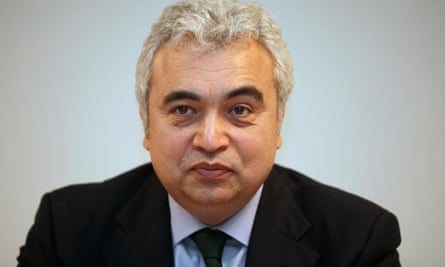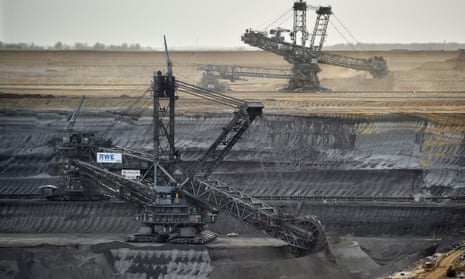The world needs a “peaceful divorce” between economic growth and the rise in greenhouse gas emissions, one of the world’s leading energy economists has said – but this will only happen if a crunch climate conference in December sends a strong signal that governments are serious about tackling global warming.
Fatih Birol, incoming executive director of the International Energy Agency, said the UN conference in Paris would be “the last chance to put the energy sector on the right course”.
In an interview with the Guardian, Birol added: “If we do not get a strong signal from Paris, this [reform of the energy sector] will take a very, very long time to put right.”
Until now, more energy availability has been linked to rising prosperity but also increasing emissions. That link must be broken, Birol said, adding that this would cause economic hardship unless the world could uncouple those factors by encouraging energy companies to invest in low-carbon generation and banning the most inefficient practices.
In Paris, governments intend to sign up to a new global agreement binding all countries to limiting their carbon emissions after 2020, when current commitments end. Developed countries are expected to agree to absolute cuts in their emissions, while developing countries will place curbs on the future growth of theirs.
But current pledges from more than 30 countries imply global emissions will continue to rise until at least 2030, according to IEA analysis. That would put the world on track for dangerous levels of warming, defined as more than 2C above pre-industrial temperatures.
For the world to have a good chance of staying within the 2C limit, beyond which climate change is likely to become catastrophic and irreversible, global emissions need to peak by 2020, scientific advice says.
The IEA is proposing four measures that would allow the world to meet that target. These include the phasing out of inefficient coal-fired power stations; a large increase in investment in renewable energy; and forcing oil and gas companies to extract their fuel resources without releasing methane into the atmosphere – a technically feasible feat, at a low cost, but one which most companies ignore as they are not penalised for the release of the powerful greenhouse gas.
The IEA’s list of proposals could achieve such a timetable. The most controversial items on the list are the phasing out of inefficient coal-fired power stations, which are used in many parts of the developing world, and the recommendation that no new ones should be built.
The global energy watchdog said the reforms were necessary as a “bridging strategy” to bring down carbon output before 2020, when any agreement arising from the Paris conference would kick in.

Old designs of coal plants waste much more energy and produce far more carbon per unit of electricity than more modern technology. But they are cheaper to build and so are often preferred in rapidly emerging economies, particularly in south Asia. At present, among Asia’s most prominent economies, at least half of all new power plants use the inefficient old technologies. If modern designs were used instead, the savings in emissions would be equal to the savings from the European Union’s new pledge to cut emissions by 40% by 2030, according to the IEA.
The extra cost would be more than made up for in greater energy produced for the same amount of fuel. “Coal-fired power plants are our biggest challenge,” said Birol. “So this is the first thing we have to implement.”
He warned that if inefficient plants continue to be built, the world will be locked into future high-carbon growth, because those plants could continue to operate for half a century. He conceded that some developing countries could still need to burn coal, if they had few alternative indigenous resources and needed cheap energy to lift people out of poverty. But he said only these countries should be permitted to build any new coal-fired plants, which should be the most efficient possible.
The energy sector must be the focal point of the Paris conference, Birol said. “Two-thirds of emissions come from energy. We cannot be successful without this sector.”
Another key proposal from the IEA is to increase the amount of global investment in renewable energy from $270bn (£173bn) in 2014 to $400bn by 2020. This is feasible, the agency has said, if policies are adapted to phase out the subsidies many governments give to fossil fuels, by 2030 at the latest, and if investors are encouraged that governments are serious about climate change.
Oil and gas companies must also take action to eliminate the release of methane, a greenhouse gas more than 20 times as powerful as carbon dioxide, which is set free in operations such as fracking.
Most companies fail to do this, even though it is technically possible and costs on average only 1% more than extraction without the right technology. Birol said that if energy companies – several of which recently pledged to tackle global warming through a carbon price – were serious about climate change, they would take this action urgently.
All of the IEA’s proposals use only existing technology, rather than relying on potential innovations.
Amber Rudd, the UK energy secretary who will lead the country’s delegation in Paris, said: “This report from the world’s energy authority clearly shows we need to seize the economic opportunities and urgently tackle climate change. The UK has been at the forefront of global efforts by driving innovation to create a thriving low-carbon economy at home and pushing for an ambitious global climate deal.”
But when asked how the government’s decision to remove subsidies for onshore wind farms would enable the UK to “be at the forefront” of the IEA-advised push for greater investment in renewables, the Department of Energy and Climate Change did not answer.

Comments (…)
Sign in or create your Guardian account to join the discussion